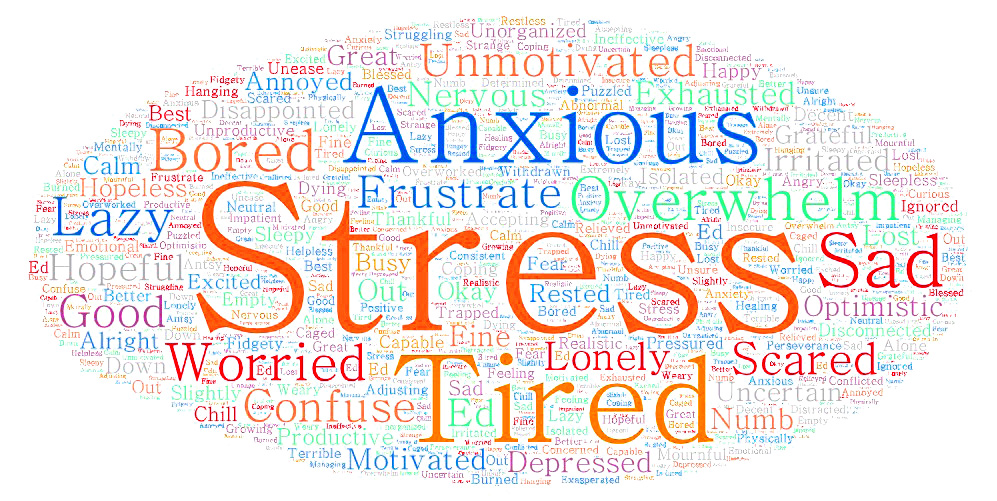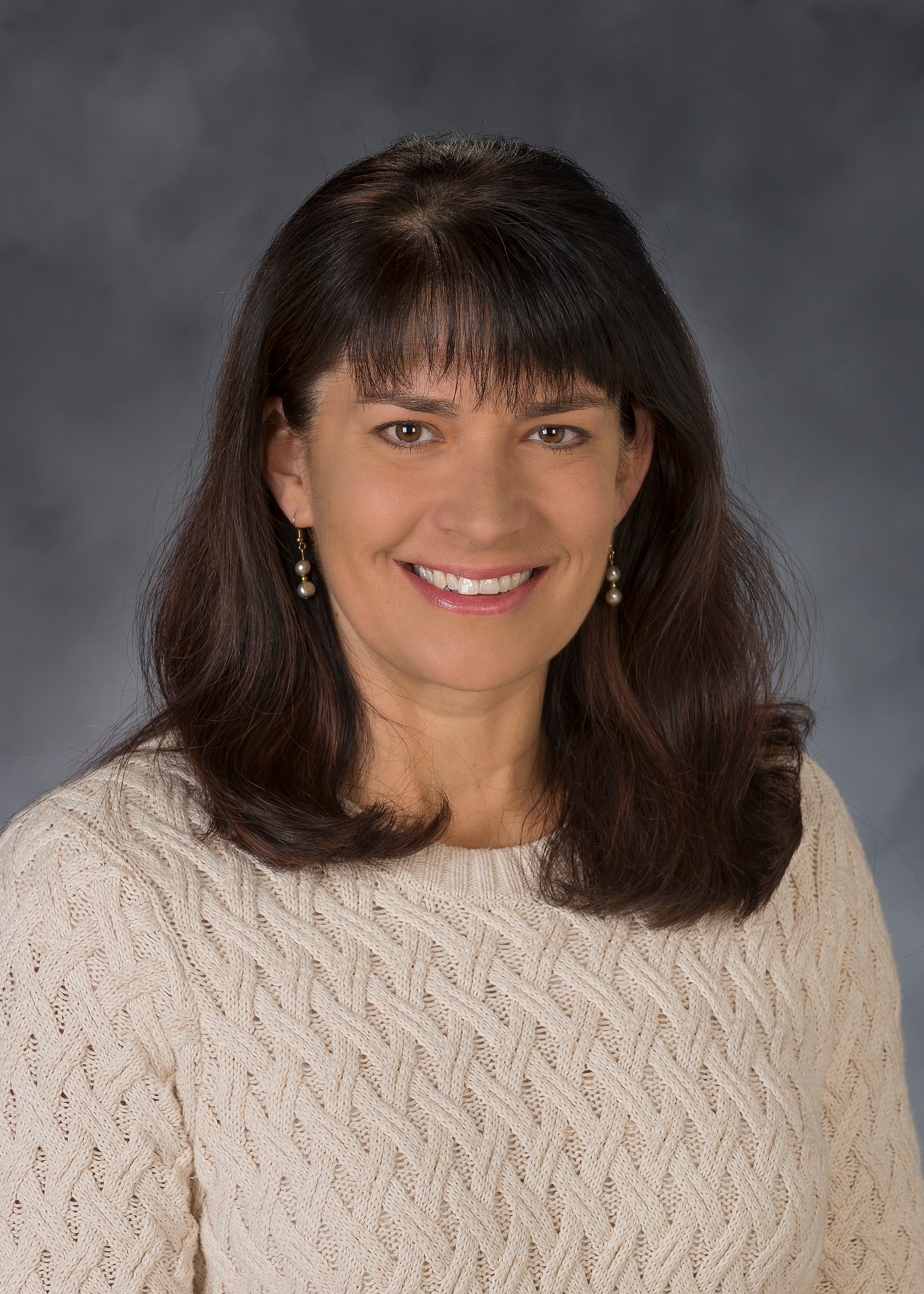
By Cynthia Hubert
Suddenly isolated and dealing with ongoing stress from the coronavirus crisis, some Sacramento State students are having trouble processing information and keeping up with their course work. But they're getting help.
Through study and implementation of simple techniques that have helped people get through traumas such as natural disasters and war, Sac State professors and peer mentors are giving students opportunities to cope.
Trauma and chronic stress can alter the brain chemistry and hijack a student’s ability to learn, according to Mays Imad, an Arizona faculty member, neuroscientist and expert on the subject. In a recent webinar for educators, she described the potential effects of the pandemic on students, and offered techniques for helping them navigate the fallout.
 Kelly McDonald employs techniques to provide support for students reeling from abrupt changes caused by the coronavirus pandemic. (Sacramento State)
Kelly McDonald employs techniques to provide support for students reeling from abrupt changes caused by the coronavirus pandemic. (Sacramento State)Kelly McDonald, director of Sac State’s Center for Science and Math Success, attended the webinar, drawn to the topic in part because of significant changes she noticed in students following the University’s switch to virtual learning in March. Students said they are having trouble sleeping, that studying and learning in cramped spaces at home is a challenge, and that they are feeling depressed and anxious. Some outstanding performers are falling behind.
Such reactions are common in trauma situations, said Imad, coordinator of the Teaching and Learning Center at Pima Community College in Tucson. Imad, who as a child in Iraq attended school during wartime, said chronic stress can cause chemical changes in areas of the brain linked to memory and learning. It also can prompt attention problems, sleep disruption and a decreased ability to make good decisions.
Imad said she believes "we are facing an even bigger trauma” from the coronavirus crisis than she and her classmates experienced during the 1991 Iraq war. “COVID-19 has placed us in a position where we’re all experiencing trauma” because of fears about the virus, the abrupt shutdown of most businesses and the mandate to stay at home indefinitely.
Educators should begin “teaching through the lens of trauma” to help students finish their studies, she said. Students and faculty in the Center for Science and Math Success are making a concerted effort to do just that, McDonald said.
McDonald, an associate professor of biology, is using techniques she learned in the presentation to assist her own students. They include discussing their feelings about the pandemic, expressing hope and empathy, and being more flexible about assignments and deadlines. She also reminds students that their reactions are normal and success is still possible.
“Every single student I’ve spoken with has expressed stress or anxiety” tied to the virus and the switch to virtual classes, she said. In addition to having to adapt to new ways of learning, many students have lost jobs, must care for family members and are finding it difficult to concentrate amid distractions at home, she noted.
“They’re struggling,” McDonald said. Studying the effects of trauma is “another way of understanding and helping my students during a difficult time.”
Students also are helping one another. Eric Minguela, a Sac State chemistry major and leader in the Peer Assisted Learning (PAL) program, recently launched a project to help others adapt psychologically and physically to their new college realities.
“In my own life, I have dealt with depression and anxiety,” Minguela said. “My symptoms were exacerbated after the coronavirus outbreak happened, so I figured lots of other students probably were having that experience as well.”
Minguela formed a group he called the No Barriers to Success – or “No BS” – squad. In addition to their usual responsibilities helping students navigate course work, Minguela and fellow PAL facilitators created and disseminated a set of documents focused on managing stress and adapting to studying from home. The documents are thoroughly researched and based on published literature.
One of the handouts, titled “Getting Comfortable With Your Home Space,” encourages students to create a study area that “acts as a sanctuary rather than a prison.” It suggests designating one room or area as study space, and enhancing it by playing soft music, adding a plant or lighting a candle.
“Change out of your pajamas before you crack open your books to give your mind another signal that this isn’t lounge time but study time,” the document advises.
Other tutorials address topics such as how to identify and respond to symptoms of anxiety, maintaining a schedule, and staying active.
The information is helping Minguela stay focused while he shelters in place with his mother and sister in Tulare, he said. He hopes it will resonate with others.
Minguela, who plans to attend medical school, said he and many other science students are feeling a lack of motivation “to study, to drive harder, to continue forward and get great grades” since they have pivoted to online learning.
McDonald and her colleagues are hearing similar stories.
Enid Gonzalez-Orta, a biology professor and director of Sac State’s Science Educational Equity program, recently polled students about their concerns and how the University might help.
Almost universally, she said, students used words such as "stress," "worried," "scared," "sad," "confused," and "tired" to describe their situations. Science students, in particular, miss the fellowship of collaborating face to face in classes and labs, survey results showed.
“I’ve lost two jobs, my single mother lost her three,” one wrote. “It is hard to study with two babies in the house and the stress of paying bills. It is impossible to focus.”
Another responded, “Adjusting to constantly staying at home has to be one of the hardest things to do this year. It honestly takes away most student motivation to do assignments and just log into Zoom. Mentally, this is taking a toll, and I wish professors could see that and realize this isn’t how we want to learn, and it is so much more difficult.”
Although many students are showing the effects of trauma, “they are trying their best to manage both school and home lives that are not often easy,” Gonzalez-Orta said. “Overwhelmingly, students still want to learn. It has been a very tough transition for all.”
McDonald said she has been contacting students who seem to be scuffling or are in danger of dropping classes. She has assured them that she is willing to work with them to help them get through the semester by offering alternative assignments or allowing them to turn in papers later than the original deadlines.
“When I reached out and got very personal about how they were doing, I got immediate responses,” she said. “They opened up.”
The trauma-informed learning webinar “made me a believer” in the impact of stress on studies, she said.
“I had four students who were in danger of getting no credit, and now they are all back on track,” thanks in part to the techniques she learned from the presentation, McDonald said.
“It’s about informing, connecting, protecting and re-directing,” she said.
McDonald would ultimately like to see trauma training become routine for faculty members.
“I’m an optimist,” she said. “However, I think there is going to be more pressure to do things remotely going forward, and there will be many bumps in the road related to this outbreak in the future.
"We may be experiencing acute trauma now, but I believe there will be a long-term impact.”
To receive PAL’s tip sheets about handling stress during online course instruction, e-mail pal@csus.edu.
